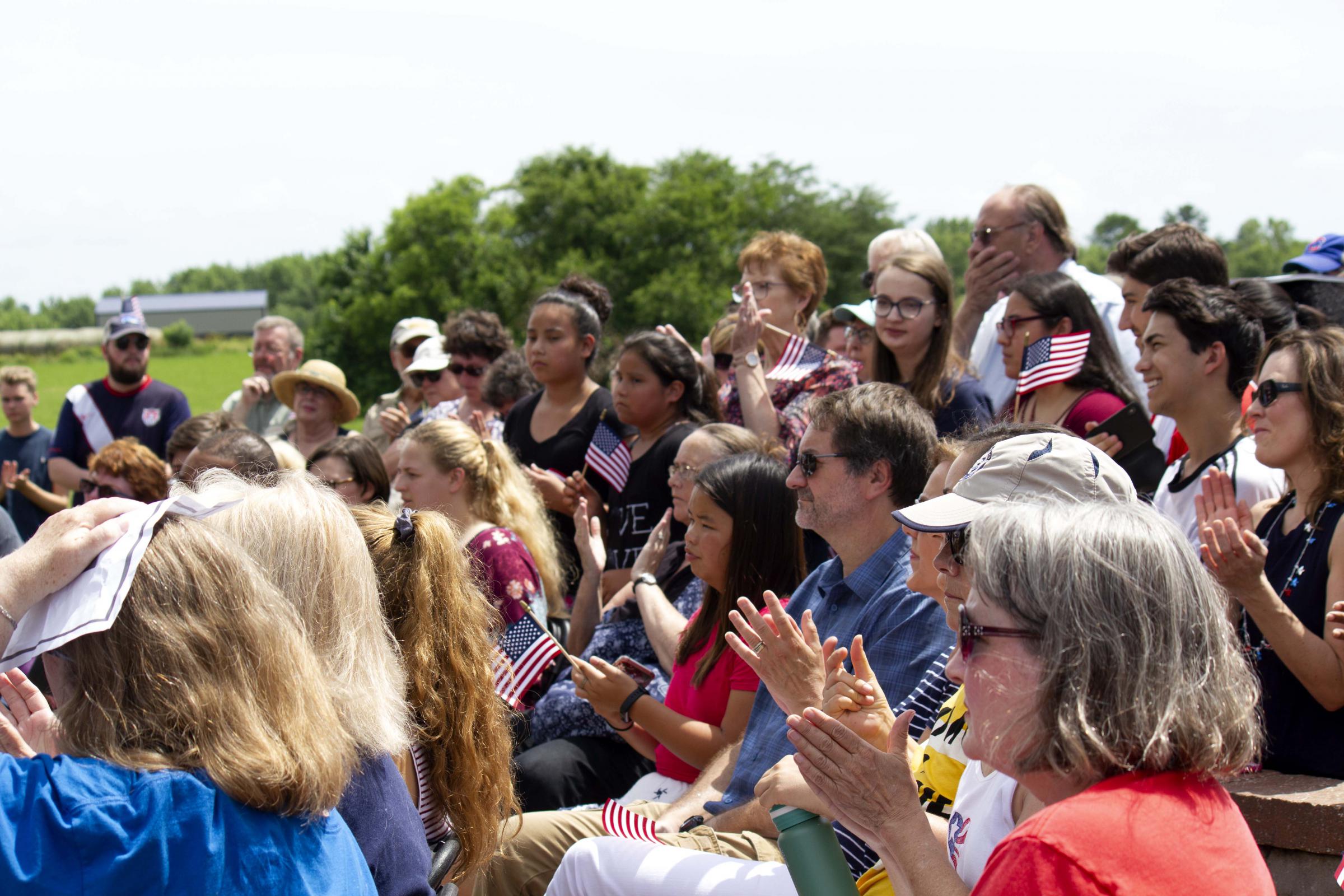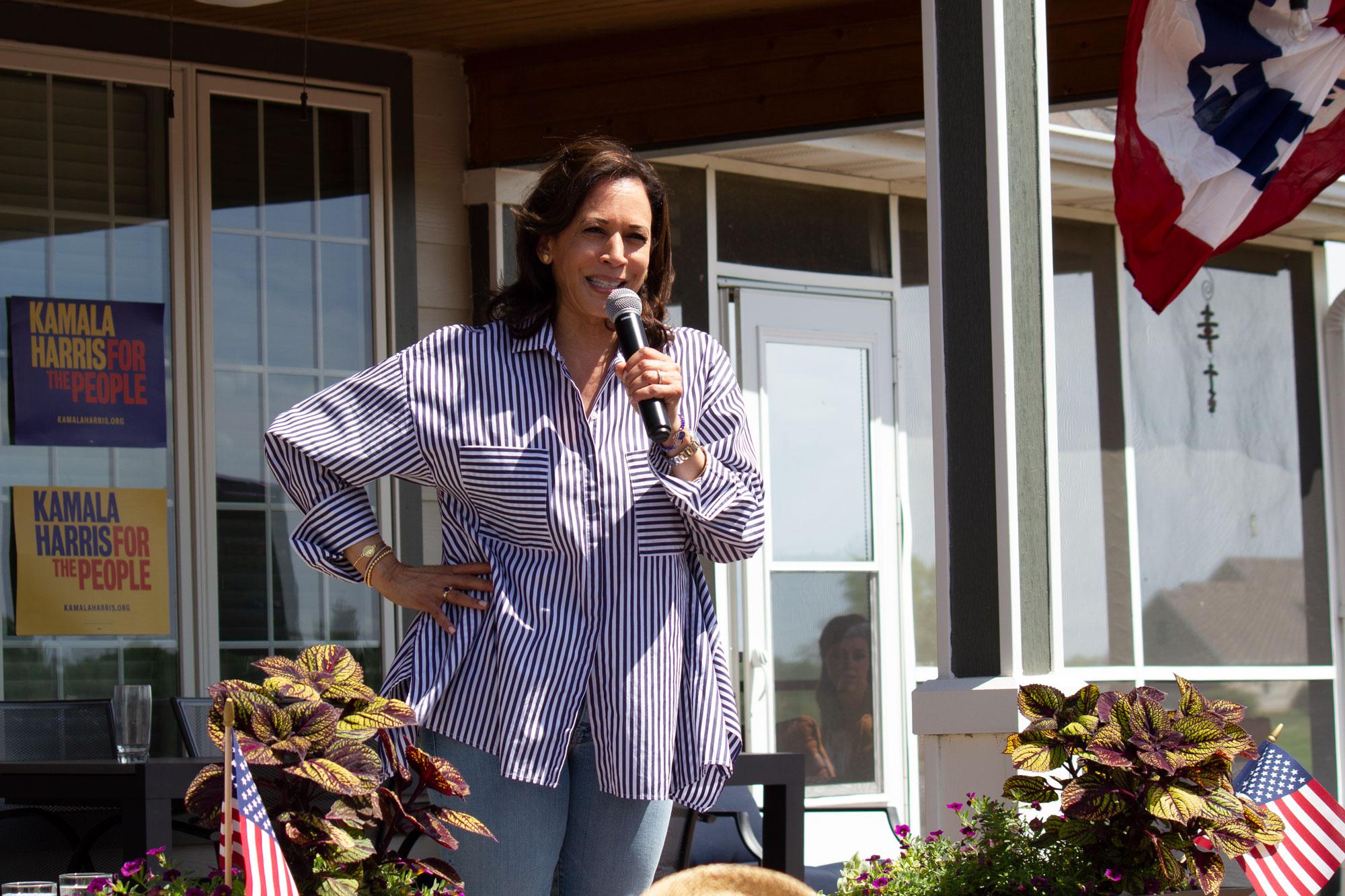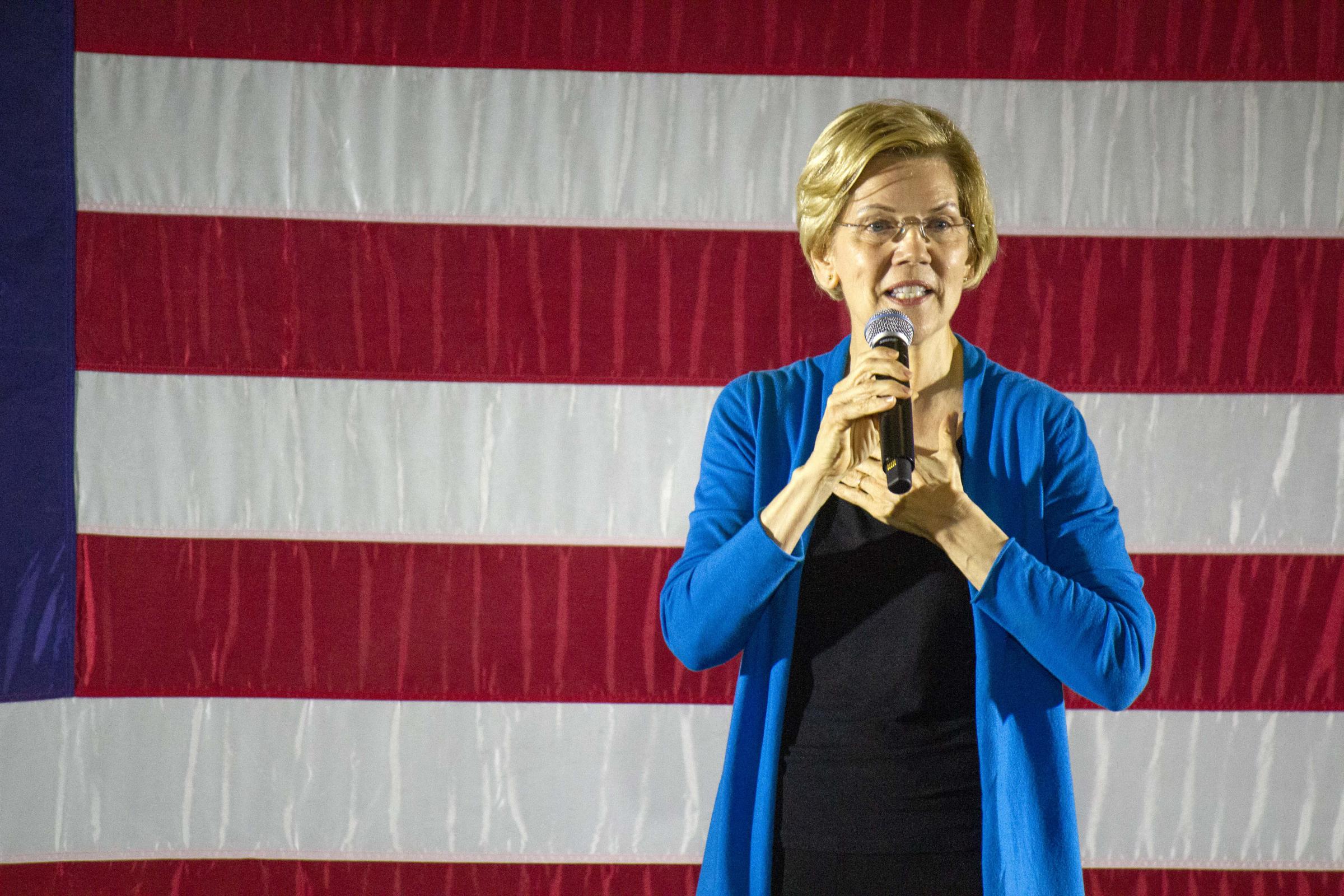
The crowd applauds during an event for U.S. Sen. Kamala Harris in Indianola, Iowa. (AMY MAYER / HARVEST PUBLIC MEDIA)
Presidential candidates have been fanning out across Iowa for months ahead of the 2020 election, creating an opportunity for voters to get agricultural issues on the national agenda.
Iowa’s first-in-the-country caucuses are on Feb. 3, 2020, and this time around there’s little competition on the Republican side. But more than 20 Democrats are vying for their party’s nomination.
“The joke always is, if you ask one person in Iowa or New Hampshire, ‘Have you decided on a candidate?’ ‘No I’ve only met them two or three times,’” University of Iowa political scientist Tim Hagle said.
Candidates are trying to attract voters who aren’t committed to either party by showing they care about Iowa’s interests, like agriculture. Most have accepted an invitation to speak at the Iowa State Fair and many will visit some of the state’s more rural communities.
On the Fourth of July, a crowd mingled ahead of California U.S. Sen. Kamala Harris’ stop in Indianola, a small city that’s home to Simpson College. Warren County boasts a couple of outlying Des Moines suburbs, but much of it is still farmland, as evidenced by the corn and soybean fields that stretched around two sides of the backyard event.
Voters here chose President Barack Obama only once, and then twice selected the Republican (Donald Trump in 2016 and Mitt Romney in 2012). So, Democrats hope to regain their footing in places like this and that begins with engaging them in the caucus process
Kevin Petersen isn’t registered with any political party, though he will have to choose one in order to participate in the caucus. He said hot-button social issues probably aren’t what he and his neighbors will base their decisions on.
“The economic issues, when they’re going to make a significant impact to a rural area, or a semi-rural area, like Warren County,” he said, “(are) probably going to sway things a lot more in 2020.”
Petersen’s not a farmer, but he’s listening to what candidates plan to do about trade, especially the tariffs that have drastically reduced soybean sales to China.
“Farmers appreciate the support that they’re getting from the government,” he said, referring to subsidies including the Market Facilitation Program, which aims to reduce the financial impact of trade disputes. “But they want to be able to have fair trade and have that sustainable.”

Another Indianola voter, David Kitsis, also sees area farmers struggling.
“The farmers need help right now, big time,” he said, “and the current administration’s not doing it, with the tariffs with China and such, you know, so we’ve gotta get somebody else in there.”
In her stump speech at the event, Harris questioned the president’s stated support for farmers.
“We’ve seen a president of the United States who came into office saying that he was going to protect farmers, yet he initiates trade policy by tweet,” she said, “with the result that Iowa farmers, many are looking at the potential for bankruptcy, many are looking at soybeans rotting in bins, many are looking at a market that they cultivated over at least a decade to sell to China that has now been cut off.”
Promises of policies
Other candidates are taking on Big Ag. New Jersey U.S. Sen. Cory Booker reintroduced a bill this year to immediately halt major agribusiness mergers. And Massachusetts U.S. Sen. Elizabeth Warren says if she’s elected president, she’ll undo the completed Bayer-Monsanto merger.
“Remember, you can continue to consider the monopolistic impact of these mergers even after they occur,” she told Iowa Public Radio in an interview. “So this is not one of those where, darn, this happened and now there’s nothing we can do but wring our hands. We can actually push back, it just takes the courage to be willing to do that.”

The small, rural and relatively homogenous states of Iowa and New Hampshire are sometimes criticized for their early role in the presidential selection process. But Hagle said they use their position to raise issues that matter in many largely rural states but otherwise might be squashed by urban and suburban priorities.
CNN’s debates in July gave a glimpse of other rural issues candidates are willing to raise on the national stage. Ohio U.S. Rep. Tim Ryan called for regenerative agriculture. And former Texas Congressman Beto O’Rourke specifically mentioned cover crops and conservation easements — two strategies for improving water quality and preventing soil loss.
Both parties’ candidates have a history of pandering to Iowa interests, Hagle said, but Iowans have a long memory for those caucus-season promises. Obama, for instance, had a tough re-election campaign in the state in 2012.
“He made an awful lot of promises as a candidate and was not able to follow through, at least not to the extent that a lot of voters wanted,” Hagle said.
When candidates really oppose a front-and-center issue in Iowa, some just skip the state.
“I can remember candidates from years past, John McCain one in particular, who said, ‘look, I’m opposed to these ethanol subsidies so I know I’ve got no chance in Iowa.’ So in the 2000 campaign, he didn’t even really campaign here,” Hagle said.
Compare that tactic to Minnesota Democratic U.S. Sen. Amy Klobuchar, who’s already toured an ethanol plant and used the visit to show her support for the Renewable Fuel Standard. And Trump came out in favor of ethanol ahead of the 2016 Iowa Caucus. Though he didn’t win it, Iowa’s Republican senators have made a point to hold him to his commitment.
Hagle said that’s the sort of legacy the Iowa caucuses can foster. But it’s not clear whether any agriculture issue will rise to that level for Democrats in 2020.
Follow Amy on Twitter: @AgAmyinAmes












